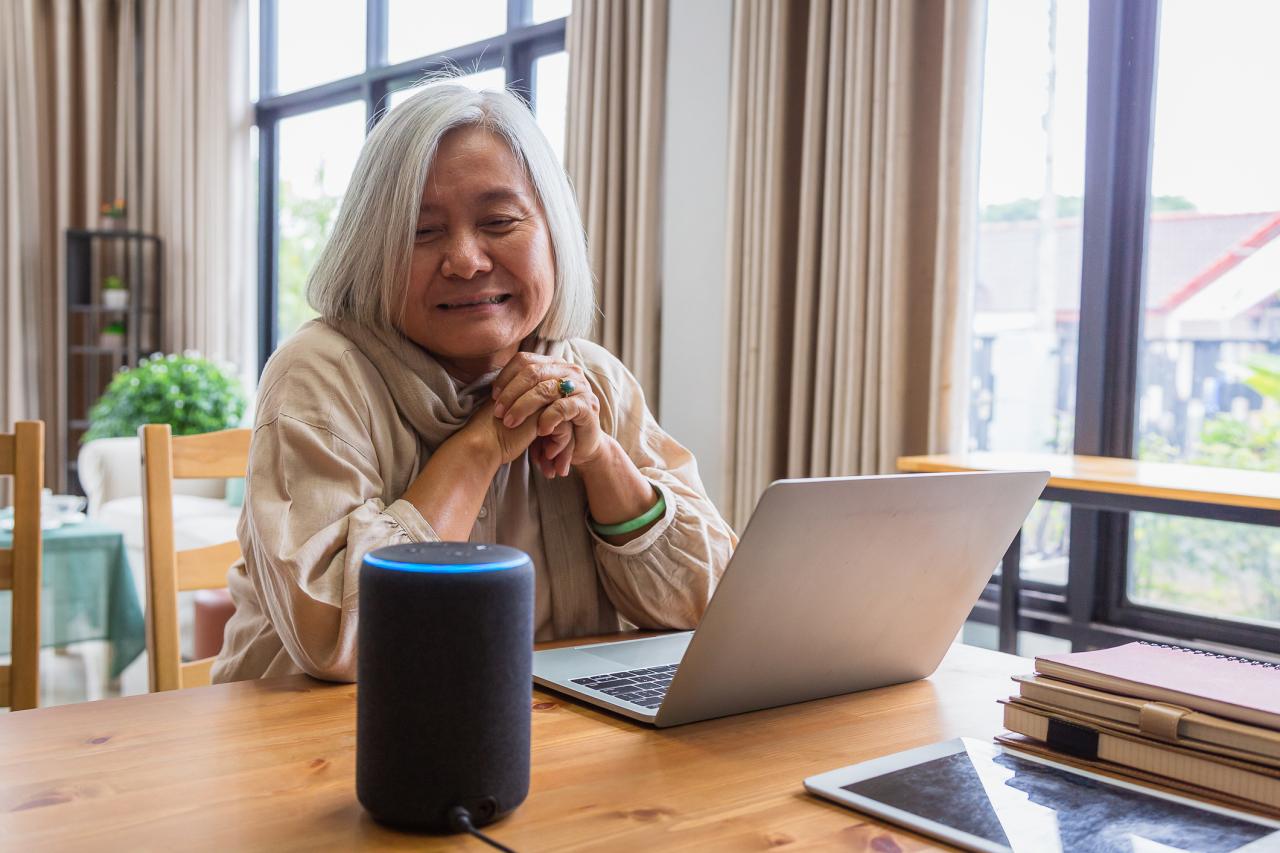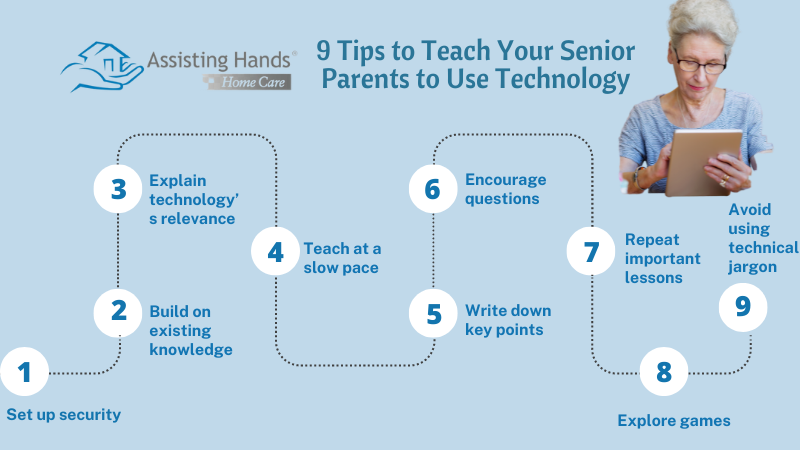Delving into Technology Tips for Seniors: Making Digital Life Easier, this introduction immerses readers in a unique and compelling narrative, with casual formal language style that is both engaging and thought-provoking from the very first sentence.
In today's digital age, technology plays a crucial role in the lives of seniors. Embracing technology can bring numerous benefits, but it also comes with its own set of challenges. Let's explore how seniors can make their digital life easier with some helpful tips.
Importance of Technology for Seniors

Technology plays a crucial role in the lives of seniors in today's digital age, offering numerous benefits and opportunities for enhancing their daily activities and overall well-being.
Enhanced Communication
- Seniors can easily stay connected with loved ones through video calls, emails, and social media platforms, reducing feelings of isolation and loneliness.
- Access to communication apps allows seniors to share moments and memories with family and friends in real-time, fostering closer relationships.
Improved Access to Information
- With the internet at their fingertips, seniors can quickly find information on health, hobbies, news, and more, empowering them with knowledge and resources.
- Online educational platforms offer seniors the opportunity to learn new skills and pursue interests from the comfort of their homes.
Convenience and Efficiency
- Technology enables seniors to manage tasks such as banking, shopping, and appointments online, saving time and effort.
- Smart devices and applications provide convenience in daily activities, from setting reminders to monitoring health metrics.
Challenges in Technology Adoption
- Seniors may face challenges such as technological complexity, fear of making mistakes, or concerns about privacy and security when adapting to new technologies.
- Limited exposure to digital tools and lack of familiarity with devices can hinder seniors from fully embracing the benefits of technology.
Choosing User-Friendly Devices
When it comes to selecting devices for seniors, it's important to consider ease of use and accessibility features to make their digital experience more enjoyable and productive.
Large Screens
Seniors often prefer devices with larger screens as it makes it easier to read text, navigate apps, and view content. Opting for smartphones, tablets, or computers with bigger displays can enhance the overall user experience.
Simple Interfaces
Choosing devices with simple interfaces is crucial for seniors who may not be tech-savvy. Look for devices that have intuitive navigation, clear icons, and minimal clutter on the screen to reduce confusion and frustration.
Accessibility Features
It's essential to select devices that offer accessibility features like adjustable text sizes, voice commands, screen magnification, and easy-to-use gestures. These features can greatly assist seniors with visual or hearing impairments in using the device effectively.
Operating Systems Comparison
When comparing operating systems like iOS, Android, and Windows, consider the user-friendliness factor for seniors. iOS devices are known for their simplicity and ease of use, making them a popular choice among older adults. Android devices offer a wide range of options and customization but may have a steeper learning curve.
Windows devices cater more to traditional computer users and may be suitable for seniors familiar with the platform.
Basic Digital Skills
In today's digital world, having basic digital skills is essential for seniors to stay connected and engaged. These skills can help seniors communicate with loved ones, access important information, and enjoy various online activities. Here is a guide to some essential digital skills that seniors should learn:
Setting Up Email Accounts
Setting up an email account is the first step in getting started with digital communication. Follow these steps to set up an email account:
- Choose an email service provider like Gmail, Yahoo, or Outlook.
- Visit the provider's website and click on the "Sign Up" or "Create Account" button.
- Fill out the required information, such as your name, desired email address, and password.
- Verify your account through the confirmation email sent to you.
- Once verified, you can start sending and receiving emails.
Using Messaging Apps
Messaging apps are a convenient way to stay in touch with family and friends in real-time. Here's how seniors can use messaging apps:
- Download a messaging app like WhatsApp, Facebook Messenger, or Skype from the app store.
- Create an account using your phone number or email address.
- Add contacts by searching for their names or phone numbers.
- Start a conversation by typing a message and sending it to your contact.
- You can also make voice or video calls through these apps to connect face-to-face.
Browsing the Internet and Online Searches
Browsing the internet allows seniors to access a wealth of information and entertainment. Here are some tips for browsing the internet and conducting online searches:
- Open a web browser like Google Chrome, Safari, or Firefox on your device.
- Use the search bar to look up specific information or websites.
- Click on search results to visit websites and read articles.
- Use search engines like Google to find answers to your questions.
Staying Safe Online
It's crucial for seniors to stay safe while using the internet. Follow these tips to protect yourself online:
- Avoid clicking on suspicious links or ads that may contain viruses or malware.
- Use strong and unique passwords for your accounts to prevent hacking.
- Be cautious when sharing personal information online, especially on social media platforms.
- Keep your devices and software updated to protect against security threats.
Utilizing Assistive Technologies

Assistive technologies play a crucial role in helping seniors navigate the digital world with ease and independence. These tools are designed to assist individuals with various challenges, such as vision impairments, hearing loss, or mobility issues.
Memory and Medication Reminders
Memory and medication reminders are essential for seniors to maintain their health and well-being. Here are some recommended apps and devices:
- Medisafe: A medication reminder app that helps users track their medications and set reminders for doses.
- PillPack: A service that organizes medications into convenient packets with date and time labels for easy consumption.
- Reminder Rosie: An alarm clock with personalized voice reminders for tasks and medication schedules.
Health Tracking
Monitoring health parameters is crucial for seniors to stay on top of their well-being. Here are some assistive technologies tailored for health tracking:
- Fitbit: A wearable device that tracks activity levels, heart rate, and sleep patterns to promote an active lifestyle.
- Blood Pressure Monitor: Devices like Omron's blood pressure monitor provide accurate readings for better health management.
- Glucometer: For seniors with diabetes, a glucometer like Accu-Chek helps monitor blood glucose levels effectively.
Vision Assistance
For seniors with visual impairments, assistive technologies can enhance their digital experience. Here are some tools designed for vision assistance:
- ZoomText: A screen magnification software that enlarges text and images for better visibility.
- OrCam MyEye: A smart camera device that reads text aloud and recognizes faces to assist with daily tasks.
- Color ID Free: An app that identifies colors through the smartphone camera for color-blind individuals.
Hearing Support
Seniors with hearing impairments can benefit from assistive technologies that improve communication and accessibility. Here are some recommended devices for hearing support:
- Hearing Aid Apps: Smartphone apps like Eargo and Oticon provide personalized sound amplification for better hearing.
- Signia Assistant: An app that connects hearing aids to smartphones for easy customization of settings and sound preferences.
- Amplified Phones: Devices like Clarity's amplified phones offer louder volume and clearer sound for phone conversations.
Epilogue

As we conclude our discussion on Technology Tips for Seniors: Making Digital Life Easier, it's evident that with the right guidance and tools, seniors can navigate the digital world with confidence. By incorporating user-friendly devices, mastering basic digital skills, and utilizing assistive technologies, seniors can enhance their quality of life and stay connected in today's fast-paced technological landscape.
Questions and Answers
Why is technology important for seniors?
Technology is crucial for seniors as it helps them stay connected with loved ones, access information easily, and engage in activities that promote mental stimulation and overall well-being.
How can seniors choose user-friendly devices?
Seniors should opt for devices with large screens, simple interfaces, and accessibility features. It's essential to consider ease of use and functionality when selecting smartphones, tablets, or computers.
What basic digital skills should seniors learn?
Seniors should focus on skills like setting up email accounts, using messaging apps, browsing the internet, conducting online searches, and understanding online safety measures.
How do assistive technologies help seniors?
Assistive technologies like voice assistants and magnifiers aid seniors in various tasks, including memory assistance, medication reminders, and health tracking. These technologies cater to different needs such as vision, hearing, and mobility.











